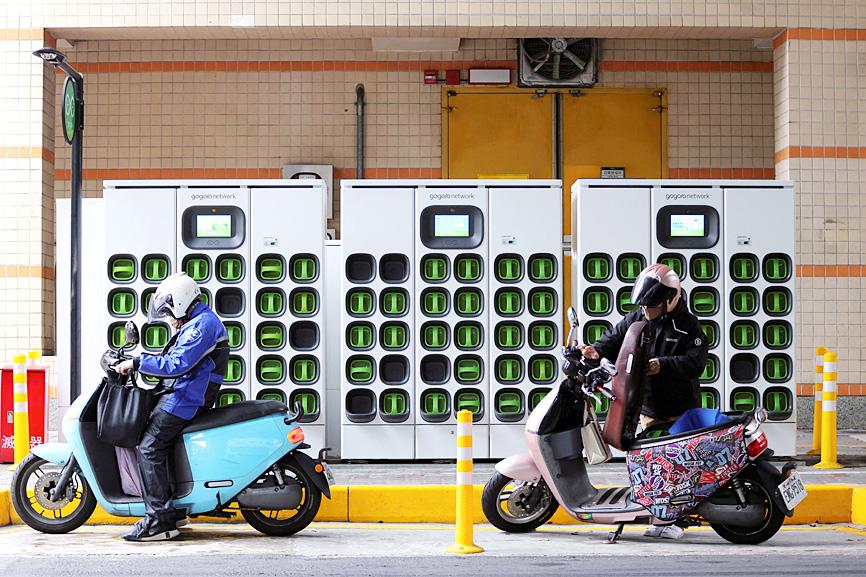Electric scooter maker Gogoro Inc (睿能創意) has all the chips it needs for now, but could face a squeeze by year-end as it pushes big plans to grow in China, India and Southeast Asia, founder and chief executive Horace Luke (陸學森) said yesterday.
While a global shortage of semiconductors has slammed auto makers, Luke said in an interview that Gogoro, which listed in New York this month, uses far fewer chips than electric automakers and still has a relatively small market concentrated in Taiwan.
For the next several months it has a “healthy supply” of chips, he said.

Photo: Annabelle Chih, Reuters
“A combination of we don’t use as many, a combination of being flexible on our design, a combination of having a market that is not yet gigantic at the moment,” Luke said, explaining Gogoro’s chips situation.
Founded in 2011, Gogoro listed on the NASDAQ via a merger with blank-check firm Poema Global Holdings Corp and has a market value of about US$2.4 billion.
The firm has ambitious plans for China, India and Southeast Asia, seeing potential in replacing vast fleets of heavily polluting, gasoline-powered scooters with electric two-wheelers as Asia’s metropolises bid to improve air quality.
“As those cities like Jakarta, or Delhi, or other big markets grow, how fast they grow of course will then put stress on our supply chain management, but those are problems that are coming in the later part of the year, not the immediate future,” Luke said.
As well as making its own vehicles, Gogoro has electric battery and other partnerships with vehicle makers, including India’s Hero MotoCorp Ltd, and China’s Dachangjiang Group Co (大江集團) and Yadea Group Holdings Ltd (雅迪集團控股).
Gogoro, known for its green-hued battery swap distribution network for riders, generates about 90 percent of its revenue from Taiwan.
Electric vehicle makers have been hit by price hikes for raw materials such as nickel, driven by supply chain disruptions from the war in Ukraine, and Luke said some “minor” price rises had been passed onto customers.
Gogoro’s stock has dropped about 19 percent since listing, matching pressure on other tech plays globally.
However, Luke said Gogoro was confident in expansion plans in countries like China, India and Indonesia, which have a high consumer preference for scooters, with millions sold each year.
“That’s what our investors, our team, is focused on, and that’s what our partnerships are focused on, to take our technology which we’ve created and go into those large markets that have high potential to convert to electric,” he said.

Sweeping policy changes under US Secretary of Health and Human Services Robert F. Kennedy Jr are having a chilling effect on vaccine makers as anti-vaccine rhetoric has turned into concrete changes in inoculation schedules and recommendations, investors and executives said. The administration of US President Donald Trump has in the past year upended vaccine recommendations, with the country last month ending its longstanding guidance that all children receive inoculations against flu, hepatitis A and other diseases. The unprecedented changes have led to diminished vaccine usage, hurt the investment case for some biotechs, and created a drag that would likely dent revenues and

Global semiconductor stocks advanced yesterday, as comments by Nvidia Corp chief executive officer Jensen Huang (黃仁勳) at Davos, Switzerland, helped reinforce investor enthusiasm for artificial intelligence (AI). Samsung Electronics Co gained as much as 5 percent to an all-time high, helping drive South Korea’s benchmark KOSPI above 5,000 for the first time. That came after the Philadelphia Semiconductor Index rose more than 3 percent to a fresh record on Wednesday, with a boost from Nvidia. The gains came amid broad risk-on trade after US President Donald Trump withdrew his threat of tariffs on some European nations over backing for Greenland. Huang further

CULPRITS: Factors that affected the slip included falling global crude oil prices, wait-and-see consumer attitudes due to US tariffs and a different Lunar New Year holiday schedule Taiwan’s retail sales ended a nine-year growth streak last year, slipping 0.2 percent from a year earlier as uncertainty over US tariff policies affected demand for durable goods, data released on Friday by the Ministry of Economic Affairs showed. Last year’s retail sales totaled NT$4.84 trillion (US$153.27 billion), down about NT$9.5 billion, or 0.2 percent, from 2024. Despite the decline, the figure was still the second-highest annual sales total on record. Ministry statistics department deputy head Chen Yu-fang (陳玉芳) said sales of cars, motorcycles and related products, which accounted for 17.4 percent of total retail rales last year, fell NT$68.1 billion, or

MediaTek Inc (聯發科) shares yesterday notched their best two-day rally on record, as investors flock to the Taiwanese chip designer on excitement over its tie-up with Google. The Taipei-listed stock jumped 8.59 percent, capping a two-session surge of 19 percent and closing at a fresh all-time high of NT$1,770. That extended a two-month rally on growing awareness of MediaTek’s work on Google’s tensor processing units (TPUs), which are chips used in artificial intelligence (AI) applications. It also highlights how fund managers faced with single-stock limits on their holding of market titan Taiwan Semiconductor Manufacturing Co (TSMC, 台積電) are diversifying into other AI-related firms.